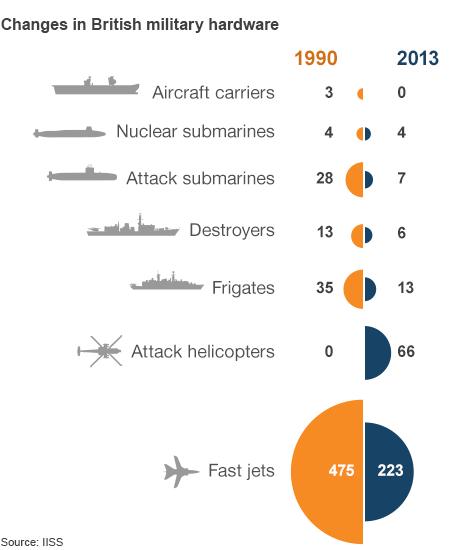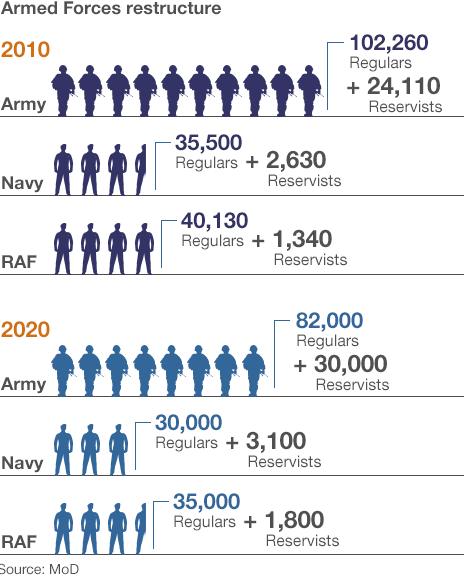David Cameron dismisses Robert Gates' defence cuts warning
- Published
- comments
David Cameron said Robert Gates ''had got it wrong''
David Cameron has dismissed a warning from ex-US defence secretary Robert Gates that armed forces cuts would diminish the UK's military standing.
The prime minister said Britain has the world's fourth largest defence budget and was a "first class-player in terms of defence".
The UK plans to cut 30,000 armed forces personnel by 2020, leaving 147,000.
Mr Gates said the erosion in Britain's capabilities had reduced its ability to be a "full partner" to the US.
He told BBC Radio 4's Today programme the "fairly substantial reductions" in UK defence spending meant it "won't have full spectrum capabilities" - meaning the ability to fight on air, land and sea - that it had previously.
Mr Cameron, however, said Mr Gates was "wrong", adding that Britain was investing in its "future capabilities".
Robert Gates: British forces have 'limited' capabilities
"We've got a massive investment programme of £160bn in our defence industries, in our equipment," he said.
"We are a first-class player in terms of defence and as long as I am prime minster that is the way it will stay."
The Ministry of Defence said the UK - like the US - had had to take "tough decisions" on defence spending but had "the best trained and best equipped armed forces outside the US".
Mr Gates, who served under presidents Obama and Bush, singled out cuts to the Royal Navy as particularly damaging and he noted that - for the first time since World War One - Britain did not have an operational aircraft carrier.
Mr Gates warned against nuclear disarmament by the UK, but acknowledged that there was scope for changes to the way the deterrent was deployed.
Under the government's proposals, by 2020 the Army will lose 20,000 soldiers, the Royal Navy 6,000 personnel and the RAF 5,000 - although there are also plans to increase the number of reservists in each service.
Mr Gates's comments echo the concerns of senior military figures in the UK.
The Chief of the Defence Staff, General Sir Nicholas Houghton, warned last month Britain could be left with the "spectre" of a hollowed-out force.
Admiral Lord West, the former First Sea Lord, told the BBC the government had underestimated how important the government's relationship with the US was and had not factored that in when deciding on the cuts.
He also said the gap with no aircraft carrier, between scrapping the Ark Royal and the introduction of a new aircraft carrier in 2020, represented a "huge risk".
Lord Dannatt says US claims about UK military have 'ring of truth'
The former head of the British army, General Sir Richard Dannatt told BBC Two's Daily Politics programme: "Has the UK thought sufficiently at what its strategic interests are in the future? What is the quality of the relationship we want to have with the United States in the future and, dare I say it, with Europe?
"These are big issues and these are issues that have got to be confronted in the next defence review after the next election. What is Britain's ambition in the world?"
Former Defence Secretary Liam Fox defended Britain's defence policy, saying it was "one of only four or five countries inside Nato" to meet the target of spending 2% of GDP on defence.
However, Labour's shadow defence secretary Vernon Coaker said the prime minister should be worried about the concerns of "Britain's strongest ally".
"No-one is disputing the financial constraints within which the UK military must operate. But the government must ensure that Britain's defence capability is maintained."
The Chairman of the Defence Select Committee James Arbuthnott said Britain needed "to look again at how much we can spend on defence", and cited Gen Houghton's previous comments about how the UK could be left with a "hollowed-out force" as something that should worry the prime minister.
Meanwhile, Stop the War Coalition convenor Lindsey German said "many people in the country don't particularly like the special relationship with the US" and would not be concerned by Mr Gates's comments.
She said in times of austerity defence spending was the "wrong priority".


- Published16 January 2014
- Published19 December 2013
- Published6 November 2013
- Published9 January 2014